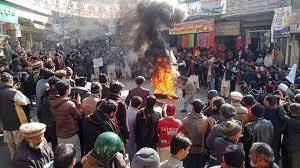
Roads are blocked by mobs, enchanting slogans against other sects; claiming one-self the true Muslims, while the resets are heretics and pagans. This is the land of Gilgit Baltistan, where the whole region is overwhelmed with the hysteria of sectarian violence and zealots, which was used to be the land of peace, harmony and beauty, just few weeks ago.
Tourists and travelers are reluctant to travel to this region and even the international community has issued red alerts to their natives to not to fly here. All these mayhems prove Marx' golden words: "religion is opium of society" by letter and spirit.
Recent unrests preluded by a social media campaigns, later transformed into mass gatherings and public sit-in in different parts of the province, particularly in Chilas against a Shia clerk, alleged for passing derogatory statements against one of the Companions of Prophet Muhammad SAW.
An FIR was filed against the said clergy and the local Shia community came out on roads in different parts of Baltistan, especially in Skardu. Public resentment came to its zenith, after a sway of verbal attacks by religious authorities against one another's sacrosanct belief.
The people of Gilgit Baltistan, particularly youth are the fundamental culprits behind these unrests. Though they are highly educated they are not mature enough which compels them to be sentimental and make emotional decisions rather than rational ones. Most of them are protesting either on roads or showing their anger on social media, further exacerbating the situation. They are urging to become an absolute Shia or Sunni, which subdues their self-consciousness and critical thinking, making them the pawns of few clergymen, consequently.
It is unfortunate that religion is in the hands of some illiterate and myopic people.
One can't expect any constructive approach from these "Mullahs" to cool down such situations because they are intellectually, morally and academically mean. They are always in quest of such pretexts which give them fame and popularity by exploiting the naive people.
Rationally, if any sect has reservations over the 'Criminal Laws Amendment Bill, 2023', they should have to opt proper forum to record their protest, instead of making it as public discourse.
In this recent case, nonetheless, religious authorities from both sides rebuked one another beliefs, publically, for the sake of their heavens, by making our heaven- Gilgit Baltistan, a hell.
The role of administration and other government institutions also comes into question. The enactment of the 'Criminal Laws Amendment Bill, 2023' in a specific are, while it is yet dormant in rest of the country enshrines the incapacity or malicious intensions of local administration.
Critics also highlighted the involvement of some hidden hands in this turmoil to divert the public and media from the on-going political instability and record inflation.
The reasons are so abstruse but one thing is quite lucid, the poor people of Gilgit Baltistan have to bear the brunt.
Over the last few years the overwhelming response within and outside of the state, regarding the tourism industry of Gilgit Baltistan came as a silver line to uplift the socio-economic situation of the region. The growth of hotels, rest houses and other infrastructure developments attracted tourists, resulting into the inculcation of thousands of job opportunities for locals.
However, ongoing crises have usurped all these vistas and perhaps, it will take years to attain the current threshold, again. Moreover, it also deteriorates CPEC and other foreign investment, as these uprisings are used by regional countries such as India as a narrative building against Pakistan on global forums to sabotage Pakistan's principle stance on Kashmir.
Therefore, people need to be cognizant, they have to stick with their own beliefs, but be conscious as well: no one can use their emotions as sectarian titillation. Religious authorities must be cautious while promulgating any remarks, as their words can bring a storm in a tea cup. The prudent role of media is inevitable to unify the society by subduing differences and hates among people.
Lastly, the Federal and Provincial Government along with other state edifices also have to diffuse these tensions on earnest basis, rather than try to fish in a troubled water for the better interest of the people and the society.

